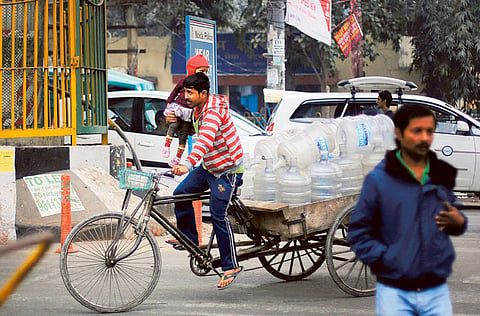India: More than 10,000 illegal bottled water units in Delhi put lives at risk
They use labels of licensed manufacturers, putting the health of millions of people at risk

New Delhi/Noida: More than 10,000 illegal packaged water bottling units are operating in the National Capital Region, often using the labels of the 64 licensed manufacturers, putting the health of millions of people at risk, say industry officials. But local health officials seem oblivious of the danger to people’s health and safety.
“It may sound horrific but only 64 water bottling plants have the licence to supply packed drinking water in the national capital and the NCR,” said Pankaj Aggarwal, the president of the Bottled Water Processors Association.
“It’s a big reason for worry. Despite not getting clearances from the Bureau of Indian Standard (BIS), supplies from such unlicensed plants is equal to the quantity of bottles supplied by the licensed plants,” Aggarwal said.
“Such illegal units are mostly located in slums and congested bylines of Delhi, Haryana and Uttar Pradesh. They hardly meet the standards of water purification, but escape getting checked by government officials due to their location.”
In a recent case, cockroaches were found in water drums supplied to the headquarters of the East Delhi Municipal Corp. After a probe, the supplier was found to be an illegal operator. But the unit could not be traced as there was no record with the industry association.
In another case, a house fly was found in water supplied to a media organisation in Noida.
“If the condition of Delhi is like this, then what will be the situation in the other parts of the country. But I do not have any official data on it,” union Health Minister Harsh Vardhan said.
“It is the duty of the Delhi government to submit data of such unlicensed operators to the central government. Only when we receive such a report can we frame more stringent policies to stop such malpractices,” Harsh Vardhan said.
North Delhi Municipal Corp. Mayor Yogender Chandolia gave some alarming data. “I believe the number of unlicensed bottling units in Delhi is over 10,000. There’s a shortage of drinking water in many parts. Operating illegal units is a lucrative business,” he said.
“We did a survey this year and over 2,000 people were caught running unlicensed water bottling plants in parts of North Delhi alone. But no action was taken against them. This has again given them the freedom to keep running their illegal business.”
In fact, the Delhi High Court asked the government agencies in May 2010 to crack down on bottling units selling water without a licence and a proper certification from the BIS. But that hasn’t helped, bona fide bottlers say.
Aggarwal said every registered water bottling unit has to set up a lab for testing the presence of chemicals and microbes. These reports have to be submitted to the Bureau of Indian Standards every week. They also have to give water samples to a government lab.
“But such tests are conducted only on the licensed plants. The unlicensed plants do not have to undergo any such test. They operate unhindered — even without proper water purification equipment,” he said.
Each unit has to pay an annual fee of Rs100,000.
“The point to be noted is that while licensed water bottling plants sell around 10,000 of water bottles every day, the unlicensed bottling plants manage to sell 30,000-40,000 bottles every day.”
Sign up for the Daily Briefing
Get the latest news and updates straight to your inbox



